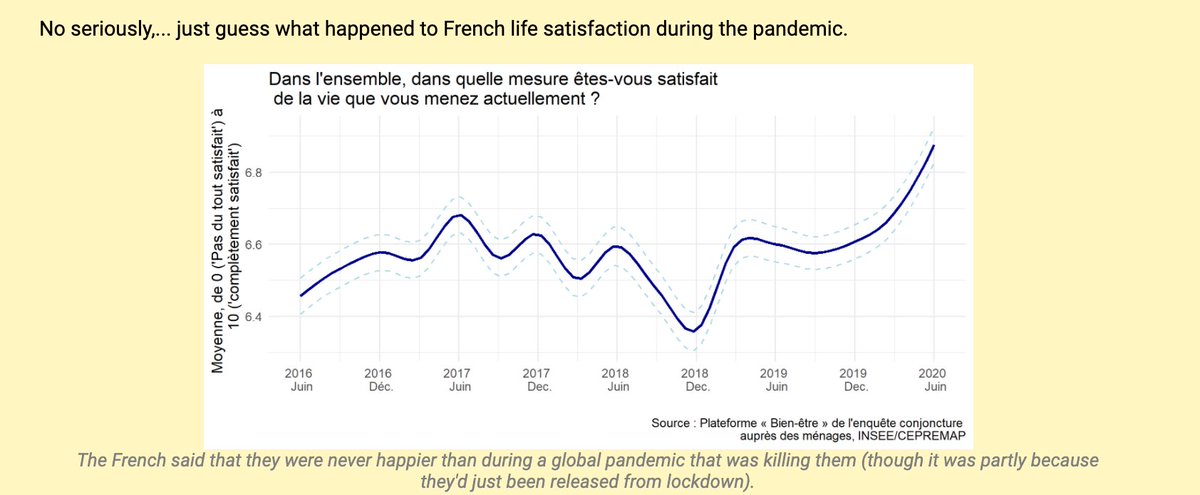
This is super-interesting and very insightful, I think. "Performative miserabilism" is a great turn of phrase. I was *most* struck by this graph. I realize his point was, "Ignore this graph, they weren't telling the truth before," but I'm not sure that's the best explanation. 
https://twitter.com/EuphoricEuler/status/1374236284420513793

It might also suggest that @NighswanderJon was exactly correct on yesterday's @cosmo_globalist Cosmopolicast: claireberlinski.substack.com. People aren't furious at the government's response because they quite like the pandemic.
There could be an enormous number of reasons for this. Most people, after all, don't die. It may be on balance more pleasing to people to sit at home, pursue their hobbies, and stay well away from big family gatherings. Especially since no one is starving.
I don't know whether his interpretation or Jon's is more correct. Could be a bit of both. But the latter would explain why there's not more outrage about the government's incompetence. Perhaps people's lives on balance have actually improved.
Maybe losing Grandma struck them as a reasonable price to pay to be away from the French Office, which is notoriously toxic, and the pressures of everyday life, which *are* unusual in France because of the social demand, generally, for extremely disciplined behavior:
(This has always been my theory about why the French are so riot-prone. This is a culture that places an unusual number of formal and informal limits on behavior. Everyone understands the phrase, "Ça se fait pas." The pressure cooker just blows, once in a while.)
It may well be that the reason people *aren't* rioting is precisely the reason they *usually* riot. They've had a break from the pressure of being French. (This pressure isn't pointless: They've built a magnificent country by being French. It's just a hard thing to be.)
Do I believe the statistics about vaccine hesitancy are bogus? No. I've spoken to too many people who've expressed the sentiment, in seriousness, to doubt that a big problem lies ahead. Right now it's supply, but it's going to be demand. I'll be thrilled if he's right;
but it would be *completely irresponsible* to bet on it. This is a problem everyone responsible, at every level of government, and even internationally, must be working to solve. Now. Yes, the elderly got their shots--but they're the ones at highest risk.
Most people will, of course, get vaccinated. But if you want to achieve herd immunity, you just can't have a huge proportion of the population who refuses. And a solid third of France is truly pretty insane:
As in, he's *probably* right they'll vote for Macron again. You get what I mean?
But certainly the term "performative miserabilism" is dead-on. And certainly, the French never, ever, think about the UK. The obsession is entirely one-way.
But certainly the term "performative miserabilism" is dead-on. And certainly, the French never, ever, think about the UK. The obsession is entirely one-way.
• • •
Missing some Tweet in this thread? You can try to
force a refresh





